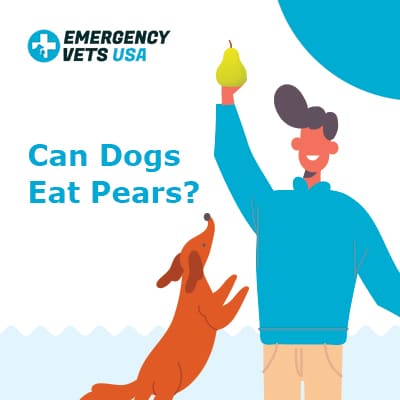Can Dogs Eat Pears?
For humans, pears are a healthy and tasty treat. Pears are a favorite fruit for many and is full of minerals, vitamins, and satisfying sweetness. Can they be shared with our dogs though? Like most dogs, they are ready for treats at any time of the day.
Go ahead and give them a bite, because pears are just as good for them as they are for humans. When prepared properly, you can share your healthy, sweet snack with your dog. The vitamins A and C, and the soluble fiber is good for dogs, in moderation.
How Should You Prepare Pears for Your Dog?

Pears are good for dogs, and when prepared properly, they are safe. Be sure to wash the pear to remove any chemicals that may be on it. Then remove the core, seeds, and stem. You don’t want your dog eating the seed because they can contain trace amounts of cyanide. This is the general rule for any fruit with kernel, pits, seeds, or stones. They can contain amygdalin, a compound that breaks down into hydrogen cyanide, which is a poison. Don’t worry if your dog ate a few seeds, they would need to eat more than just a few to get sick.
Additionally, pitted fruits such as pears when swallowed can cause your dog to choke. They can also get stuck in their intestinal tract. If they don’t pass the core of a pear, surgery could be required. When it comes to the pear skin though, they are full of health benefits your dog can have.
Recap of how to prepare pears when sharing this sweet treat with your dog:
- The ripest pear – be picky!
- Remove leaves and stalk.
- Thoroughly wash to remove any chemicals and residue.
- Slice the fruit in the middle, then cut one half of the fruit in two pieces.
- Remove any seeds and cut away any core left on the fruit.
- Cut the two pieces into one-inch slices.
- Medium to large size dogs can safely have two fresh slices, small size dogs, give only one slice.
- You can create several treats from one slice by cutting it up into small pieces.
- Freeze some chunks for a cool treat on a hot day.
What If You Accidentally Left A Seed or Two?
No need to panic over one seed, or even a few seeds left in the fruit. Before they become harmful, your dog would need to consume a large amount of seeds, more than they could eat probably. Do your best to keep seeds away from them, but not a big deal if some slip by.
Rotten Pears Are A No-No!
Never give your dog a rotten pear, or a pear close to rotting. You wouldn’t eat it, so don’t feed it to them either! Any rotten fruit will give them serious stomach aches and problems. Fresh, ripe pears are always best.
How Much Is Too Much Pears?
Clean, ripe, seedless pears are healthy for your dog. Like anything though, moderation is the key. Allowing your dog to have a whole pear could give them a tummy ache and that could lead to diarrhea or vomiting. Big pieces can choke them, so cut up the prepared slices in chunks of one inch or smaller and feed them just a few chunks at a time.
When Is Fruit Dangerous to A Dog?
Occasional rewards or treats are great for your dog when you have prepared them properly. There are some things about fruit that you do need to watch though:
- Never give them green fruit. The possible side-effects for their digestive system aren’t worth it.
- Always remove the core, seeds, and stems. Seeds have cyanide and a large amount can be toxic.
- A whole pear can choke them, always slice then cut into 1 inch chunks.
- Whole fruit digested can obstruct the bowel.
- Remove any leaves and stalks, the rigid texture can damage the esophagus lining.
- Pears are a naturally sweet food, occasionally treats are acceptable, but too much of a good thing is bad on their teeth, tummy, and for their weight. Keep in mind that pears have natural sugars which can cause problems if you feed your dog too much.
- Fresh, ripe pears only! Candied or canned pears syrup is high in sugar. Never give canned or candied pears to your dog.
- Molded, rotten, or spoiled fruit will upset their stomach and can cause diarrhea.
- Never give them fermented fruit, this is a base for alcohol and alcohol isn’t good for dogs.
Offer Pears In Moderation
Remember, pears that are prepared properly are good for your dog in moderation. They contain antioxidants, fiber, minerals, and vitamins. These are things that improve their blood cells, digestive system, and heart health.

Leslie Brooks graduated from the University of Tennessee College of Veterinary Medicine in 2012. After graduation she moved to Indianapolis to do an intensive one-year internship at a specialty practice and then began working as a small animal general practitioner. She ran her own house call practice for three years, visiting pets in people’s homes. Currently, she works part time in clinical practice and volunteering her free time to serve pets of the homeless. Read more about us here.
